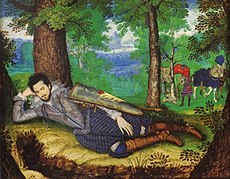steve_bank
Diabetic retinopathy and poor eyesight. Typos ...
Have not heard te term in modern times
Thomas Jefferson and contemporaries were deists. Jefferson created a version of the bible without the supernatural.
Argument by design s an old argument for god.
 en.wikipedia.org
en.wikipedia.org
Thomas Jefferson and contemporaries were deists. Jefferson created a version of the bible without the supernatural.
Argument by design s an old argument for god.
Deism - Wikipedia
Deism (/ˈdiːɪzəm/ DEE-iz-əm [1][2] or /ˈdeɪ.ɪzəm/ DAY-iz-əm; derived from Latin deus, meaning "god")[3] is the philosophical position and rationalistic theology[4] that rejects revelation as a source of divine knowledge, and asserts that empirical reason and observation of the natural world are exclusively logical, reliable, and sufficient to determine the existence of a Supreme Being as the creator of the universe.[3][4][5][6][7][8] Deism is also defined as the belief in the existence of God solely based on rational thought, without any reliance on revealed religions or religious authority.[3][4][5][6][7] Deism emphasizes the concept of natural theology, that is, God's existence is revealed through nature.[3][4][5][6][8]
Since the 17th century and during the Age of Enlightenment, especially in 18th-century England and France, various Western philosophers and theologians formulated a critical rejection of the religious texts belonging to the many institutionalized religions and began to appeal only to truths that they felt could be established by reason alone as the exclusive source of divine knowledge.[4][5][6][7] Such philosophers and theologians were called "Deists", and the philosophical/theological position that they advocated is called "Deism".[4][5][6][7] Deism as a distinct philosophical and intellectual movement declined towards the end of the 18th century.[4] Some of its tenets continued to live on as part of other intellectual movements, like Unitarianism, and it continues to have advocates today.[3]
Enlightenment Deism
Origin of the word deism
The words deism and theism are both derived from words meaning "god": Latin deus and Greek theos (θεός).[3] The word déiste first appears in French in 1564 in a work by a Swiss Calvinist named Pierre Viret[9] but was generally unknown in France until the 1690s when Pierre Bayle published his famous Dictionnaire Historique et Critique, which contained an article on Viret.[10]
In English the words deist and theist were originally synonymous, but by the 17th century the terms started to diverge in meaning.[11] The term deist with its current meaning first appears in English in Robert Burton's The Anatomy of Melancholy (1621).
Herbert of Cherbury and early English Deism

Lord Herbert of Cherbury, portrayed by Isaac Oliver (1560–1617)
The first major statement of Deism in English is Lord Herbert of Cherbury's book De Veritate (1624).[12] Lord Herbert, like his contemporary Descartes, searched for the foundations of knowledge. The first two-thirds of his book De Veritate (On Truth, as It Is Distinguished from Revelation, the Probable, the Possible, and the False) are devoted to an exposition of Herbert's theory of knowledge. Herbert distinguished truths obtained through experience and reasoning about experience, from innate truths and from revealed truths. Innate truths are imprinted on our minds, and the evidence that they are so imprinted is that they are universally accepted. Herbert's term for universally accepted truths was notitiae communes – Common Notions. When it came to religion, Herbert believed that there were five Common Notions.
- There is one Supreme God.
- He ought to be worshipped.
- Virtue and piety are the chief parts of divine worship.
- We ought to be sorry for our sins and repent of them.
- Divine goodness dispenses rewards and punishments, both in this life and after it.
Herbert himself had relatively few followers, and it was not until the 1680s that Herbert found a true successor in Charles Blount (1654–1693).[13]
The flowering of Deism, 1696–1801
See also: Deism in England and France in the 18th century
The appearance of John Locke's Essay Concerning Human Understanding (1690) marks an important turning point, and a new phase, in the history of English Deism. Lord Herbert's epistemology was based on the idea of "common notions", in effect, on innate ideas. Locke's famous attack on innate ideas in the Essay effectively destroyed that foundation. After Locke, deists could no longer appeal to innate ideas as Herbert had done. Instead, deists were forced to turn to arguments based on experience and nature. Under the influence of Newton they turned to the argument from design as the principal argument for the existence of God.[14]
